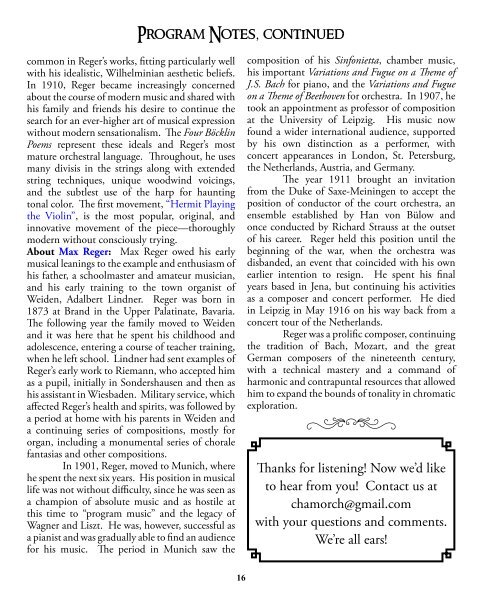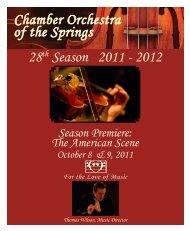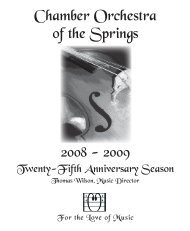Click Here For Concert Program - Chamber Orchestra of the Springs
Click Here For Concert Program - Chamber Orchestra of the Springs
Click Here For Concert Program - Chamber Orchestra of the Springs
You also want an ePaper? Increase the reach of your titles
YUMPU automatically turns print PDFs into web optimized ePapers that Google loves.
common in Reger’s works, fitting particularly well<br />
with his idealistic, Wilhelminian aes<strong>the</strong>tic beliefs.<br />
In 1910, Reger became increasingly concerned<br />
about <strong>the</strong> course <strong>of</strong> modern music and shared with<br />
his family and friends his desire to continue <strong>the</strong><br />
search for an ever-higher art <strong>of</strong> musical expression<br />
without modern sensationalism. The Four Böcklin<br />
Poems represent <strong>the</strong>se ideals and Reger’s most<br />
mature orchestral language. Throughout, he uses<br />
many divisis in <strong>the</strong> strings along with extended<br />
string techniques, unique woodwind voicings,<br />
and <strong>the</strong> subtlest use <strong>of</strong> <strong>the</strong> harp for haunting<br />
tonal color. The first movement, “Hermit Playing<br />
<strong>the</strong> Violin”, is <strong>the</strong> most popular, original, and<br />
innovative movement <strong>of</strong> <strong>the</strong> piece—thoroughly<br />
modern without consciously trying.<br />
About Max Reger: Max Reger owed his early<br />
musical leanings to <strong>the</strong> example and enthusiasm <strong>of</strong><br />
his fa<strong>the</strong>r, a schoolmaster and amateur musician,<br />
and his early training to <strong>the</strong> town organist <strong>of</strong><br />
Weiden, Adalbert Lindner. Reger was born in<br />
1873 at Brand in <strong>the</strong> Upper Palatinate, Bavaria.<br />
The following year <strong>the</strong> family moved to Weiden<br />
and it was here that he spent his childhood and<br />
adolescence, entering a course <strong>of</strong> teacher training,<br />
when he left school. Lindner had sent examples <strong>of</strong><br />
Reger’s early work to Riemann, who accepted him<br />
as a pupil, initially in Sondershausen and <strong>the</strong>n as<br />
his assistant in Wiesbaden. Military service, which<br />
affected Reger’s health and spirits, was followed by<br />
a period at home with his parents in Weiden and<br />
a continuing series <strong>of</strong> compositions, mostly for<br />
organ, including a monumental series <strong>of</strong> chorale<br />
fantasias and o<strong>the</strong>r compositions.<br />
In 1901, Reger, moved to Munich, where<br />
he spent <strong>the</strong> next six years. His position in musical<br />
life was not without difficulty, since he was seen as<br />
a champion <strong>of</strong> absolute music and as hostile at<br />
this time to “program music” and <strong>the</strong> legacy <strong>of</strong><br />
Wagner and Liszt. He was, however, successful as<br />
a pianist and was gradually able to find an audience<br />
for his music. The period in Munich saw <strong>the</strong><br />
<strong>Program</strong> Notes, continued<br />
16<br />
composition <strong>of</strong> his Sinfonietta, chamber music,<br />
his important Variations and Fugue on a Theme <strong>of</strong><br />
J.S. Bach for piano, and <strong>the</strong> Variations and Fugue<br />
on a Theme <strong>of</strong> Beethoven for orchestra. In 1907, he<br />
took an appointment as pr<strong>of</strong>essor <strong>of</strong> composition<br />
at <strong>the</strong> University <strong>of</strong> Leipzig. His music now<br />
found a wider international audience, supported<br />
by his own distinction as a performer, with<br />
concert appearances in London, St. Petersburg,<br />
<strong>the</strong> Ne<strong>the</strong>rlands, Austria, and Germany.<br />
The year 1911 brought an invitation<br />
from <strong>the</strong> Duke <strong>of</strong> Saxe-Meiningen to accept <strong>the</strong><br />
position <strong>of</strong> conductor <strong>of</strong> <strong>the</strong> court orchestra, an<br />
ensemble established by Han von Bülow and<br />
once conducted by Richard Strauss at <strong>the</strong> outset<br />
<strong>of</strong> his career. Reger held this position until <strong>the</strong><br />
beginning <strong>of</strong> <strong>the</strong> war, when <strong>the</strong> orchestra was<br />
disbanded, an event that coincided with his own<br />
earlier intention to resign. He spent his final<br />
years based in Jena, but continuing his activities<br />
as a composer and concert performer. He died<br />
in Leipzig in May 1916 on his way back from a<br />
concert tour <strong>of</strong> <strong>the</strong> Ne<strong>the</strong>rlands.<br />
Reger was a prolific composer, continuing<br />
<strong>the</strong> tradition <strong>of</strong> Bach, Mozart, and <strong>the</strong> great<br />
German composers <strong>of</strong> <strong>the</strong> nineteenth century,<br />
with a technical mastery and a command <strong>of</strong><br />
harmonic and contrapuntal resources that allowed<br />
him to expand <strong>the</strong> bounds <strong>of</strong> tonality in chromatic<br />
exploration.<br />
Thanks for listening! Now we’d like<br />
to hear from you! Contact us at<br />
chamorch@gmail.com<br />
with your questions and comments.<br />
We’re all ears!




